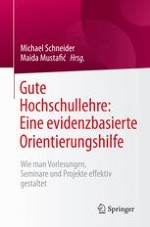2015 | OriginalPaper | Buchkapitel
3. Seminar
verfasst von : Annett Hilger, Thorben Lübbert, Igor Pretzer, Jessica Reinartz, Julia Theißen, Michael Schneider
Erschienen in: Gute Hochschullehre: Eine evidenzbasierte Orientierungshilfe
Verlag: Springer Berlin Heidelberg
Aktivieren Sie unsere intelligente Suche, um passende Fachinhalte oder Patente zu finden.
Wählen Sie Textabschnitte aus um mit Künstlicher Intelligenz passenden Patente zu finden. powered by
Markieren Sie Textabschnitte, um KI-gestützt weitere passende Inhalte zu finden. powered by
